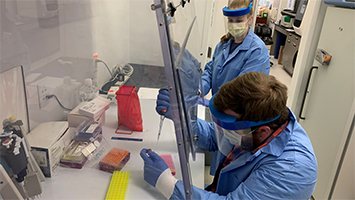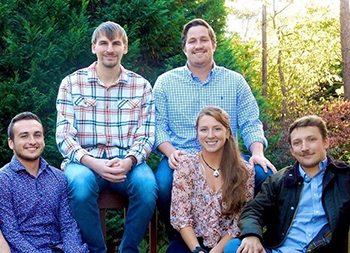UPDATED MAY 7
Since the second round of funding for the Small Business Administration’s Paycheck Protection Program (PPP) launched on April 27, Virginia banks have processed more than 46,000 loan applications for the COVID-19 relief funding for small businesses, totaling more than $3.97 billion as of May 1, according to SBA data.
“All Virginia banks are open, well-capitalized and working tirelessly for small business customers to serve their needs,” Bruce Whitehurst, president and CEO of the Virginia Bankers Association (VBA), said in a statement.
But although Virginia banks are continuing to work to get funds dispersed, bankers say that the volume of applications has slowed during round two.
“It’s not been the tsunami that Round One was,” Jeff Szyperski, chairman, president and CEO of Kilmarnock-based Chesapeake Bank, said. His bank processed more than 700 applications during the first round, but has only seen about 200 requests so far in the second round.
The 11 Virginia-based credit unions that offered PPP loans also processed 1,112 loans, totaling $126 million in the first round of PPP funding, according to the Virginia Credit Union League.
“We recognize these loans are saving jobs, saving livelihoods and ensuring our communities can weather this crisis,” League President Rick Pillow said. “Fortunately, Virginia’s credit unions entered the pandemic stronger than we’ve ever been. We worked one-on-one with business members affected by the pandemic long before the PPP was available, and we’ll continue to do so after the program ends.”
During the first round of funding, the SBA approved 1.7 million loans before the initial $349 billion small-business relief fund ran out on April 16, after just 13 days. Virginia banks made 40,371 loans totaling $8.72 billion during that first round.
Congress has allocated an additional $320 billion in PPP funding for the second round, and banks resumed making loans and taking applications on April 27. By May 1, more than half of those funds had already been loaned, with $175.7 billion committed to 2.2 million loans across the nation.
Small businesses that receive the forgivable PPP loans are allowed to use the funds to meet payroll costs and make mortgage interest, rent and/or utilities payments. Loan will be fully forgiven if 75% of the funds are used for payroll costs, according to the SBA. The other 25% can be used to make mortgage, rent or utilities payments.
What’s weighing on small businesses and banks now, though, is what forgiveness on those loans will look like, something the federal government still hasn’t communicated.
“The big thing we’re waiting on now is definitive guidance on what the forgiveness is going to look like,” Szyperski said. “A lot of the businesses are interested in that — rightly so — and so are we.”
One major difference with the most recent round of funding is that the smallest of small businesses — sole proprietorships — are applying for assistance after the SBA opened applications to this group on April 15. The average PPP loan size is now $79,000, as compared to $150,000 during the first round, according to the VBA. Sole proprietors’ requests are much lower, but can be more time-consuming, Virginia bankers say, because they are applying on their own behalf without the assistance of accountants or financial officers.
“It’s been very high-touch,” Brandon Lorey, president and CEO of Berryville-based Bank of Clarke County, says of the second round of funding. “Certainly with the earlier folks in Round One, there were a lot of the larger businesses that had their own CPAs and CFOs that we were working with. With the sole proprietorships and self-employed individuals, the 1099s, it was a little more challenging. It’s a matter of talking directly with the customers who have questions.”
Right now, the bank has 304 applications totaling $23 million, and Lorey said that — fitting with the national trend — the funding amounts have been smaller after introducing sole proprietors into the mix.
Danville-based American National Bank & Trust Company has also experienced differences between the first and second rounds.
“We were all anxiously awaiting for the additional funding to come so we could take care of our customers,” American National President and CEO Jeff Haley said. “The second round started with anxiety, waiting to hear if it was going to be funded, and if so, when.”
As of late Thursday afternoon, American National had submitted all remaining applications from the first round of funding, and also submitted its initial second-round applications. Every loan from the first and second round of funding had been processed and approved, Haley said.
Similar to Bank of Clarke County, American National’s funding requests have been smaller. As of Monday, American National had very few remaining requests, Haley said.
Richmond-based Atlantic Union Bank had processed more than 10,000 PPP loans totaling more than $1.7 billion, with a median loan amount of about $45,000, as of April 30.
“We continued to accept loan applications after the first round of funding closed, we continued to perfect our technology and processes, and we invited new customer applications,” said John Asbury, CEO and president of Atlantic Union Bankshares. “Our teammates continue to diligently serve our customers and their businesses in our communities throughout Virginia, Maryland and North Carolina. These businesses are the backbone of our communities, and we are honored to assist them through this difficult time.”
But even as regional banks have caught up to the pace of processing PPP loans, larger banks including McLean-based Capital One Financial Corp. and Wells Fargo were encountering difficulties with the PPP loans.
Wells Fargo stopped accepting PPP loan applications as of May 3, according to a COVID-19 update the bank released. “We have received hundreds of thousands of applications and are quickly preparing as many of these applications as we can for submission to the SBA before funding is fully committed,” the bank said in a statement. “In order to submit as many applications to the SBA as quickly as possible from our existing pipeline before the $310 billion in funding runs out, we will no longer accept new applications. We will submit completed applications until funds are no longer available and continue to provide additional help to our small business customers during these unprecedented times in the form of fee waivers, payment deferrals, suspension of negative credit reporting and other efforts.”
McLean-based Capital One Financial One Corp. — the largest bank in Virginia according to 2019 deposits — has continued to be criticized by business customers for not making PPP loan applications available until the day the first round of loan funding ran out. Some small-business customers circulated a petition to gather support for filing a class-action lawsuit against Capital One for not accepting applications, although the company reported May 3 that it had gotten 10,000 customers funding far, totaling more than $1 billion. “We are still continuing to process and accept new applications from eligible customers who’ve expressed interest with us and will continue to do so until funds for the program are exhausted,” said Capital One spokesperson Nicole Wyman.
“My guess is [large banks] tried to get too automated too quickly,” Lorey said. “The one nice thing about being small is that you can be nimble. It’s just the sheer volume. We’ve heard from a lot of folks who have come to us that tried with the larger institutions and never heard back.”
However, some larger banks that operate in Virginia, such as Bank of America and Truist Financial Corp., were able to process thousands of loans.
Bank of America, which operates 121 banks in Virginia, processed 3,650 PPP loans in Virginia, totaling $331 million, out of more than 250,000 PPP loans made among all of its banks, according to a release on Monday. “We processed applications for more than 250,000 small businesses during the second phase of this program, and we continue to receive and process new applications,” Dean Athanasia, head of consumer and small business at Bank of America, said in a statement. “We are happy to see the SBA has been processing submissions at a faster rate, and hopefully there is sufficient funding for everyone in need.”
Truist, which operates 444 banks in Virginia, secured approximately $10 billion in loans total across all of its U.S. banks, with an average loan size of $323,000, bank spokesperson Mike McCoy said. “Collectively, these efforts have enabled more than 32,000 businesses to keep an estimated one million people employed during this crisis,” he said. “[But] given the unprecedented demand for PPP loans Truist is experiencing, we cannot guarantee every qualified applicant will receive a loan under the PPP.”
Some small businesses that were already awarded funding have returned their loans due to the uncertainty. One Chesapeake Bank business customer returned its PPP loan funding after its sales unexpectedly rebounded and the business could no longer show that it had been negatively impacted by COVID-19, Szyperski said. American National has also had a few small businesses withdraw their applications or pay it back after the loan was funded, Haley said.
Bank of Clarke County, however, hasn’t yet had any business return funds. “I suspect that is largely due to the fact that we were fairly deliberate in our conversations with the businesses when they applied, based on the information we had at the time,” Lorey said. The bank made sure customers were conscious of the 8-week time frame when the loan could be used, that 75% spent must be spent on payroll and any laid-off employees would need to be rehired before June 30, he added.
Aside from PPP funding, the Federal Reserve has altered its $600 billion Main Street Lending Program to make it accessible to small businesses. The program now has a minimum loan amount of $500,000, half the original minimum. Small businesses that received PPP funding may also be eligible for this program. Small businesses can also apply to the U.S. Chamber of Commerce’s Save Small Business fund, which provides up to $5,000 in grants to small businesses in economically vulnerable communities. The SBA’s Economic Injury Disaster Loan Emergency Advance (EIDL) provides low-interest loans of up to $2 million. However, the SBA is currently only accepting EIDL applications from agricultural businesses.
“At this time, only agricultural business applications will be accepted due to limitations in funding availability and the unprecedented submission of applications already received,” the SBA said in a statement. “Applicants who have already submitted their applications will continue to be processed on a first-come, first-served basis.”

Subscribe to Virginia Business.
Get our daily e-newsletter.





